Home Pigeon Keeping
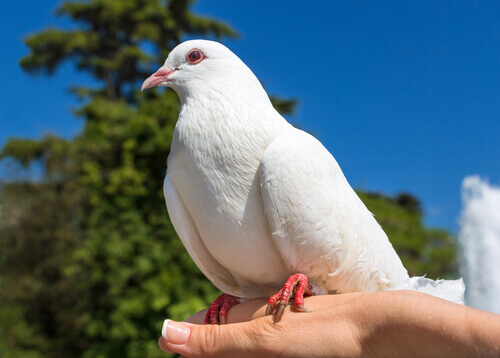
Many consider pigeons a plague due to their proliferation in cities. In fact, some people even develop a true phobia to their presence. However, home pigeon keeping continues to conquer followers around the world.
Contrary to what it may seem, these birds are hygienic and you can keep them in a completely safe way. Furthermore, they’re intelligent, sociable animals that can be easily trained.
Origins and characteristics of pigeons
People popularly use the term “pigeons” to name the numerous birds that make up the Columbiformes family. Currently, experts know about 300 different pigeon breeds distributed on the different continents. As we mentioned above, they’re considered pests in many places.
For example, if you look down your street, you’ll probably find numerous specimens of common pigeon, the most widespread breed around the world. For many centuries, people used these pigeons as messengers. In fact, they significantly contributed to the evolution of human communication.
Originally, pigeons followed an omnivorous diet that mainly consisted of grains, seeds, and some fruits. However, adaptation to large cities and dietary changes radically transformed pigeons’ bodies.
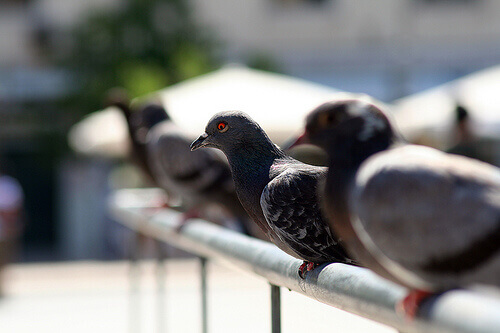
Currently, these birds are very vulnerable to the spread of internal and external parasites. In addition, they’re very prone to this type of infection.
A pigeon’s body is similar to that of other birds, such as parrots. If they’re kept in a clean and positive environment, they’ll remain active and healthy. But if they live in unsanitary conditions, they become a possible source of contamination and a transmitter of various zoonotic diseases.
Home pigeon keeping, a historic passion
Beyond a hobby, pigeon keeping is a historical activity. The pigeon’s aesthetic diversity, sociable character, and ease of learning have made successful, simple domestication possible. Below, we summarize the keys to home pigeon keeping.
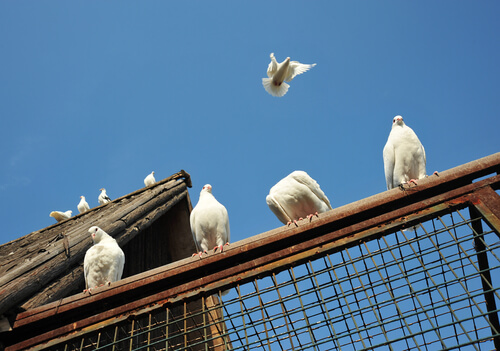
Adequate hygiene for your pigeons
Pigeons are naturally clean animals. But, like any bird, they can come into contact with many different microorganisms and host certain parasites in their body. Therefore, it’s essential for you to adopt adequate hygiene habits to ensure safe home pigeon keeping.
You should sanitize your pigeons’ cages, objects, and accessories two to three times a week. Also, it’s essential for you to wash your pigeon feeder, drinker, and poop tray daily. This way, you help prevent the proliferation of microorganisms in their body and your home.
Another good habit is to prevent the accumulation of food scraps or droppings on any accessory or at the bottom of the cage. In addition, you must offer your pigeons balanced food portions and avoid excesses or waste by removing scraps at the end of the day.
Weekly examination of your pigeons
A good home pigeon keeping practice is examining them once or twice a week. It’s important to pay special attention to the feathers and legs, where parasites usually lodge. And, when you observe any wounds or a change in their appearance, then you must go and see a specialized veterinarian.
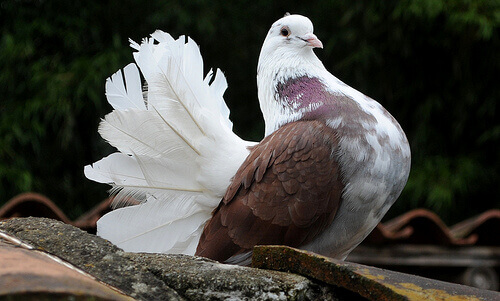
Balanced diet for healthy pigeons
All animals need a balanced diet to stay healthy, active, and happy. Proper nutrition allows pigeons to boost their immune systems and develop a better physical resistance.
A pigeon’s diet must contain many different grains to contribute fats, carbohydrates, and proteins. In this regard, you can find balanced mixes for these animals at pet shops. Also, they can eat home-cooked meals that contain corn, sorghum, oats, wheat, barley, rice, lentils, carob, flax, beans, and sunflower.
Likewise, experts recommend offering them small pieces of fruits and vegetables, mixed with the grains and seeds, once to twice a week. You must also remember that chicks should receive mashes with a higher protein index that mainly comes from small insects.
Preparing the perfect environment for home pigeon keeping
To keep pigeons at home, you must have cages or dovecotes suitable for the size of the pigeon breed. It’s essential to avoid overcrowding in the cages or dovecotes. Thus, it’s best to keep two and three birds per cage.
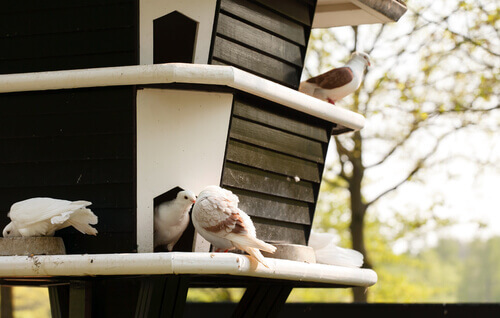
We recommend covering the bottom of the cages with gravel or newspaper to make them easier to clean. In addition, you must place some straw so that they can make their nests and lay their eggs after the breeding season.
You must choose the feeders and troughs according to the size and morphology of the pigeon breeds. This way, you prevent constant spills and future contamination.
You must also pay a lot of attention to where you place the cages. Pigeons should never be exposed to the elements. And, since they’re native to temperate or warm climates, you must keep the environmental temperature at approximately 75°F.
